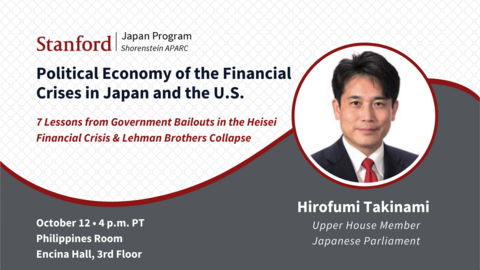U.S.-Japan Alliance Adaptation to Intensifying Strategic Competition with China

Taiwan’s January presidential election is an important milestone in an evolving geopolitical shift in East Asia characterized by a growing Chinese regional military advantage, increased Chinese military and economic coercion vis-à-vis Taiwan and other neighbors, and simmering confrontation between China and the United States who see each other as primary strategic competitors. U.S. strategy leans heavily on allies in East Asia, particularly Japan, through initiatives that aim to bolster allied military cooperation and coordinate economic security policies related to supply chains, export controls, and other measures that are important to a vibrant and international technology hub like Silicon Valley.
What are the key dynamics at play in this regional competition over power, influence, and Taiwan’s future? How should we assess efforts to adapt the U.S.-Japan security and technology alliance to meet these challenges, and what might be China’s response? What should we look for in 2024 given the Taiwan election results and political uncertainty in the United States and Japan? Our panel will feature experts on these issues to provide their views and engage in discussion with the audience.
This in-person event is co-sponsored by Sasakawa Peace Foundation USA.
Lunch will be provided.
Speakers:

Larry Diamond is the Mosbacher Senior Fellow in Global Democracy at the Freeman Spogli Institute for International Studies and the William L. Clayton Senior Fellow at the Hoover Institution. He is also the founding coeditor of the Journal of Democracy and serves as senior consultant (and previously was co-director) at the International Forum for Democratic Studies of the National Endowment for Democracy. During 2002-3, he served as a consultant to the U.S. Agency for International Development (USAID) and was a contributing author of its report Foreign Aid in the National Interest. He has also advised and lectured to the World Bank, the United Nations, the State Department, and other governmental and nongovernmental agencies dealing with governance and development.
At Stanford University, Diamond is a professor by courtesy of political science and sociology at Stanford University, where he teaches courses on comparative democratic development and post-conflict democracy building, and advises many Stanford students.

Matake Kamiya is currently a professor of international relations at the National Defense Academy of Japan (Japan’s primary military academy). He is also vice president at the Japan Forum on International Relations, an adjunct research fellow at the Japan Institute of International Affairs, a member of the research committee of the Research Institute for Peace and Security, and president of the Japan Association for International Security.
His current research interests include the US-Japan security relations, the future of the liberal international order, Japanese foreign and security policies, the Indo-Pacific security, and nuclear issues including Japan's(non-)nuclear policy. He has been serving as the leader of the Japan-US joint research project on “China Risk and China Opportunity” since 2017.

Oriana Skylar Mastro is a Center Fellow at the Freeman Spogli Institute for International Studies and Courtesy Assistant Professor of Political Science at Stanford University where her research focuses on Chinese military and security policy, Asia-Pacific security issues, war termination, and coercive diplomacy. She was previously an assistant professor of security studies at Georgetown University. Mastro continues to serve in the United States Air Force Reserve as a strategic planner at Indo-Pacific Command. For her contributions to U.S. strategy in Asia, she won the Individual Reservist of the Year Award in 2016 (CGO) and 2022 (FGO).

Jim Schoff is senior director of the “US-Japan NEXT Alliance Initiative” at Sasakawa Peace Foundation USA (based in Washington, DC) that mixes bilateral dialogue, research, and public-private engagement to help prepare the alliance for new challenges in an increasingly complex and fluid geostrategic environment. Previously, Schoff was a senior fellow and director of the Japan Program at the Carnegie Endowment for International Peace for nine years, following two years as senior adviser for East Asia policy at the US Office of the Secretary of Defense. Schoff’s career spans thirty-five years working in the fields of business, education, government, and the non-profit sector, all related to Japan, East Asia, and the US-Japan alliance.
Moderator:

Kiyoteru Tsutsui is the Henri H. and Tomoye Takahashi Professor and Senior Fellow in Japanese Studies at Shorenstein APARC, the Director of the Japan Program and Deputy Director at APARC, a senior fellow of the Freeman Spogli Institute for International Studies, and Professor of Sociology, all at Stanford University. Tsutsui received his bachelor’s and master’s degrees from Kyoto University and earned an additional master’s degree and Ph.D. from Stanford’s sociology department in 2002.
Tsutsui’s research interests lie in political/comparative sociology, social movements, globalization, human rights, and Japanese society. His most recent publication, Human Rights and the State: The Power of Ideas and the Realities of International Politics (Iwanami Shinsho, 2022), was awarded the 2022 Ishibashi Tanzan Award and the 44th Suntory Prize for Arts and Sciences.












